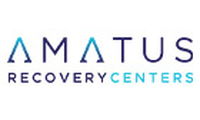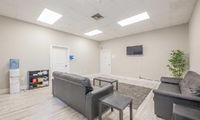Outpatient Addiction Treatment

If you're in the throes of addiction, it may seem like there's no way out but help is available and recovery is possible. Between detox, treatment, aftercare and sober housing, there are many options to help you recover from substance use disorder.
For many people struggling with addiction, outpatient treatment programs can provide the resources and support needed to help you get sober. Maybe you're not using drugs or drinking every day – or maybe you've just completed a residential treatment program. There are many reasons you might be recommended to attend an outpatient treatment program, but no matter the reason, outpatient therapy provides a number of benefits.
What is Outpatient Treatment?
Outpatient treatment is a non-residential program where clients usually attend one to four group therapy sessions each week, along with other required appointments such as individual counseling, medical appointments or psychotherapy. The goal of outpatient treatment is to help you reintegrate into your normal life while continuing the progress you find in residential programs.
An outpatient treatment center is helpful for those who don't require medical detoxification or round-the-clock supervision. The structure of outpatient rehab varies from program-to-program, but in most outpatient programs you can expect the following:
- Group therapy sessions
- Individual counseling
- Psychotherapy
- Relapse prevention planning
- Topic or skills groups
According to the National Institutes of Health (NIH), outpatient treatment can be as effective as inpatient treatment for most people seeking care who meet the appropriate recommendations for an outpatient treatment program.
There are a few primary types of therapy used in outpatient treatment programs:
Cognitive Behavioral Therapy (CBT)
This type of therapy helps clients recognize faulty or negative thinking patterns, as well as any accompanying behavior. Many outpatient groups use CBT practices, like helping clients realize and map the triggers and cravings that lead to substance abuse.
Contingency Management
This type of treatment uses prizes or incentives to help reinforce staying sober and avoiding relapse.
Motivational Interviewing
This type of therapy is intended to help people with substance use disorder build internal motivations to make changes in their lives—like going to treatment or committing to sobriety.
Twelve-Step Approach
Groups like AA or NA are common 12-step approaches for ongoing community recovery support. However some treatment centers utilize the 12 steps in their core programs, where they often use literature from AA and require 12-step meeting participation.
Inpatient vs. Outpatient
There are different pathways to recovery, and while there are common themes and strategies that may work for most people, there is no “one-size-fits all” treatment center or program.
The two primary classifications of treatment are:
Inpatient Treatment
Also called “residential treatment,” an inpatient program, requires clients to reside at the treatment facility for a designated period of time. They receive 24/7 support and regular group programming, psychotherapy, and skills-building classes. The goal of inpatient treatment is to help clients get sober and prepare to reintegrate into the community or into an outpatient program.
Outpatient Treatment
Unlike inpatient treatment, clients in outpatient rehab programs will not reside at the treatment facility, and will live either in their own homes or a sober living facility while attending treatment one to four times per week. In outpatient treatment, coping strategies and relapse prevention groups are used to help clients acclimate to a sober lifestyle while continuing to go to work, attend school or fulfill the obligations of their daily lives.
Sometimes a person will be recommended to attend an outpatient treatment program following the successful completion of an inpatient program, but for others, an outpatient program may be the first and only treatment program they complete.
To determine if an outpatient treatment program is right for you, it's important to consult a treatment center or treatment professional for an evaluation. A counselor will discuss how frequently you're using drugs or alcohol, along with other factors like prior treatment history, mental or physical health conditions and your sober support environment.
Outpatient Alcohol Treatment Centers
Whether you've struggled with alcoholism for five years or 20 years, achieving sobriety and maintaining a sober lifestyle requires effort and hard work. Attending an outpatient treatment program can help. Clients attend group sessions, individual counseling appointments, and engage in topical discussions including relapse prevention, triggers, cravings, and developing a steady sober support network. Because of alcohol's prevalence in society, one of the primary benefits of outpatient treatment is learning how to live in your own community while simultaneously using new skills to stay sober.
Outpatient Drug Rehab Centers
Recovering from drug addiction takes time. Whether you've recently completed a residential treatment program or are considering sobriety for the first time, an outpatient program is a great option when you have a strong sober support network or steady employment. Outpatient treatment can be helpful in learning how to balance the recovery lifestyle with all other aspects of life—such as family, friends, work, school and personal time.
A core part of outpatient services is working to establish a sober friend group and find regular sober support outlets, like NA/AA or SMART Recovery meetings. Through the guidance of counselors and peers in these programs, many people are able to establish new thinking patterns and coping strategies that promote long-term recovery from drug addiction.
Outpatient Therapy
If you're in a formal outpatient treatment program, you may also be recommended to attend outpatient therapy for mental health for additional recovery support.
Outpatient therapy services include:
Group Therapy
In addition to the weekly groups in an outpatient treatment program, some people find it beneficial to attend other community groups like CBT or DBT, as well as others to overcome trauma, grief or domestic violence. If you feel you would benefit from additional group therapy, ask your counselor for a recommendation or see what groups are available near you.
Mental Health Counseling
Psychotherapy is a common recommendation for many people in an outpatient treatment program. Whether you have a formal mental health diagnosis, or are interested in processing deeper concepts than can be explored in group, different forms of psychotherapy (like CBT) have many benefits and are effective in treatment.
Outpatient Rehab Cost
Just like any treatment program, the cost of outpatient treatment will vary based on the amount of hours you're recommended to complete. Other factors include amenities, insurance funding and the type of program itself.
Pricing can range anywhere between $0 and $10,000. Before you get started, it's important to talk with your treatment center about payment plans or other options they may have available. Inquire about insurance, statewide consolidated funds, or a scholarship program for free or subsidized treatment.
How to Find an Outpatient Rehab Program That's Right for You
While looking for a treatment program that's right for you, here are a few questions to ask:
How many times will you be required to attend each week?
The weekly requirements of outpatient programs vary. Some programs are designated as intensive outpatient programs (IOP) that often require more group hours than a regular outpatient program (usually two to four sessions per week). Be sure to follow your counselor’s recommendations, but also determine whether you need additional support.
How long will you be required to stay in treatment?
Some programs might last one month, and others may require weekly participation for up to three to six months. Make sure to ask an outpatient treatment program how long they typically recommend clients to stay engaged, and what their step-down program looks like. Even if it seems like a long time, remember, the ongoing support will help strengthen your recovery long-term.
What other sessions are required as a part of outpatient treatment?
As you plan to commit to outpatient treatment, see if there are any other recommendations such as mental health therapy or community support group involvement. While outpatient treatment typically allows you to work or attend school, recovery may require sacrifices to make time for the program and community support groups.
Of the many components of an outpatient treatment program, one of the most important aspects is the ability to integrate recovery into your life while keeping up with your daily routine. Recovery takes time, but with the support of an outpatient treatment program, you will learn the skills needed to develop a recovery lifestyle.













